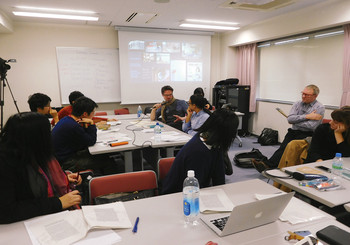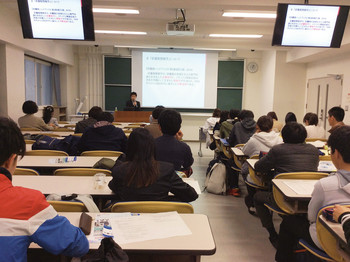Faculty of EDUCATION
Researching human minds, human relations, and social foundations of education
Enriched learning opportunities with high social impact
One primary objective of the Faculty of Education is to guide students as they acquire expert knowledge about human minds, human relations, and social foundations of education, through learning various ways to interpret diverse phenomena at the intersection of education and human society. Another goal is to encourage them to contribute to constructing a global society where people with different backgrounds can co-exist peacefully. The key outlook we seek to cultivate is one of wide perspective, understanding of diverse experience, synthetic thinking and critical judgement.
Interdisciplinary approach to education
The Department of Educational Sciences offers three specialty areas. As undergraduate students need comprehensive understanding, this institutional structure allows us to provide them with the fundamental knowledge concerning the various fields related to education. In addition, our study trajectory of gradual specialization allows them to address the complex and multilayered issues that modern education faces from multiple viewpoints.
* See below for more details on each division.
Smooth transition from foundation courses to specialization
In the first year, students study Liberal Arts and Sciences Courses to acquire a broad general education. As the year progresses, they are introduced to basic subjects for their specialized fields and subjects. In order to foster a broader view and multifaceted thinking, the faculty recommends that students also enroll in Liberal Arts and Sciences Courses offered by other faculties.
<Curriculum Ladder>
●First year / Students take courses such as "Introduction to Educational Studies" (required) and "Informatics" (recommended). They might also benefit from enrolling into courses from the teacher training program, or Liberal Arts and Sciences Courses and ILAS seminars (small group education) offered by the Faculty of Education.
●Second year / Students mainly take basic courses in specialized fields and, based on their interest and aptitude, start thinking about the divisions they will affiliate themselves with during their third year.
●Third year / Students take specialized courses from within their chosen division: Studies on Educational Foundations, Educational Psychology, or Interdisciplinary Studies of Education Systems.
●Fourth year / Students write a graduation thesis ー the culmination of their studies up to this point. For those that will go on to graduate school, writing the graduation thesis will be the first step to becoming a researcher.
Specialty Areas
Outline of Specialty Areas
Studies on Educational Foundations
Multiple perspectives on complex issues in modern education
 The courses in this division have been created for students interested in the following areas: working at schools; participating in the development of school curricula and educational assessments; examining emotional development or disorders from the preborn period, and studying educational issues from historical and philosophical viewpoints.
The courses in this division have been created for students interested in the following areas: working at schools; participating in the development of school curricula and educational assessments; examining emotional development or disorders from the preborn period, and studying educational issues from historical and philosophical viewpoints.
<Main subjects>
●Philosophy of Education, History of Education / Students analyze various educational issues from philosophical and historical viewpoints (e.g., Why do we need education? What types of schools are desirable?). They also study the establishment of school educational system, attitudes toward education from a historical viewpoint, and explore changes of education over time. Students obtain knowledge in general and concerning educational methodology in preparation to present their ideas on new learning experiences and forms of education.
●Study of Educational Methods, Developmental Science / Students learn the established theories and practices on curriculum, classroom instruction, and assessment. They also explore human physical and emotional development based on developmental science in areas where the humanities and science intersect. Overall, students should aim to discover appropriate and effective educational methods. This subject emphasizes fieldwork.
●Educational Anthropology, Clinical Education / Students primarily study thoughts by exploring the themes present under educational anthropology including the arts, the body, and languages. Students develop a sensitivity towards the deeper meanings of "words" and the ability to think practically in the field.
Educational Psychology
Broad-based knowledge and innovative thought on the mechanisms and functions of mind

 This Division fosters broader knowledge and flexible thinking about the mechanisms and functions of the mind. It has an extensive curriculum that focuses on educational and cognitive psychology and clinical psychology, providing active educational and research activities in cooperation with other units or professors of psychology in other faculties.
This Division fosters broader knowledge and flexible thinking about the mechanisms and functions of the mind. It has an extensive curriculum that focuses on educational and cognitive psychology and clinical psychology, providing active educational and research activities in cooperation with other units or professors of psychology in other faculties.
<Main subjects>
●Cognitive Psychology in Education / Students learn major theories and develop their base of knowledge on aspects of higher-order cognitive processes, including memory, language, inference, decision-making, intelligence, understanding others, empathy, and social cognition. Students also acquire and apply knowledge on psychological aspects closely related to educational activities, such as development, instruction and learning methods, motivation, and use of educational media and computers. Students develop fundamental skills for psychological research by conducting psychological experiments, surveys, and data analysis.
●Clinical Psychology / Students learn psychotherapy, psychological assessment techniques, survey methods, and methods of image representation, such as drawing and sandplay therapy, to deepen their understanding of themselves and acquire the skills necessary to support others mentally. Such expertise and skills are valued in multiple fields of work and will help interested students obtain certification as clinical psychologists through the master's course at the Graduate School.
Interdisciplinary Studies of Education Systems
Connecting education and society for the future
 In the 21st century, not only schools, but the entirety of society plays a role in education. As a result, flexibility and networking for education have become important issues. Therefore, students in the Division of Interdisciplinary Studies of Education Systems embark on creative explorations of the connections between education and society. The Division curriculum focuses on important issues that society and the next generation are anticipated to encounter and tackles these in unique courses, including small-group seminars and lectures.
In the 21st century, not only schools, but the entirety of society plays a role in education. As a result, flexibility and networking for education have become important issues. Therefore, students in the Division of Interdisciplinary Studies of Education Systems embark on creative explorations of the connections between education and society. The Division curriculum focuses on important issues that society and the next generation are anticipated to encounter and tackles these in unique courses, including small-group seminars and lectures.
<Main subjects>
●Sociology of Education / Students study the effects group education has on society and develop the sociological skills to examine related issues, such as a society based on academic credentials, juvenile problems, and educational changes.
●Lifelong Education / Students analyze education and culture from perspectives beyond compulsory schooling. Specifically, they study issues concerning social education, library and information science, and media culture.
●Comparative Education, Educational Policy / Students explore various education systems comparatively, through examination of policies, practices, and theories in countries across the world. This comparative research is done in conjunction with studying educational administration, financial systems, and concrete policy development from a policy science perspective.








